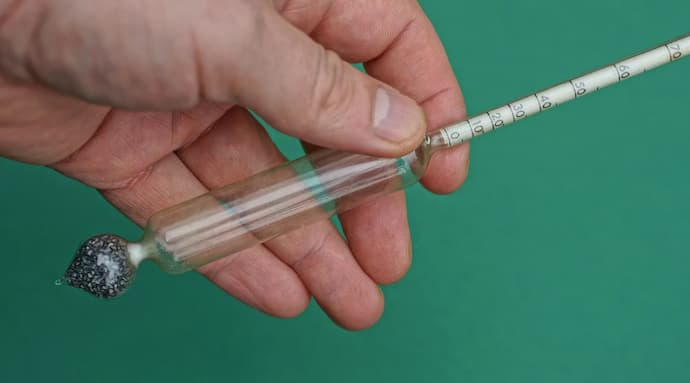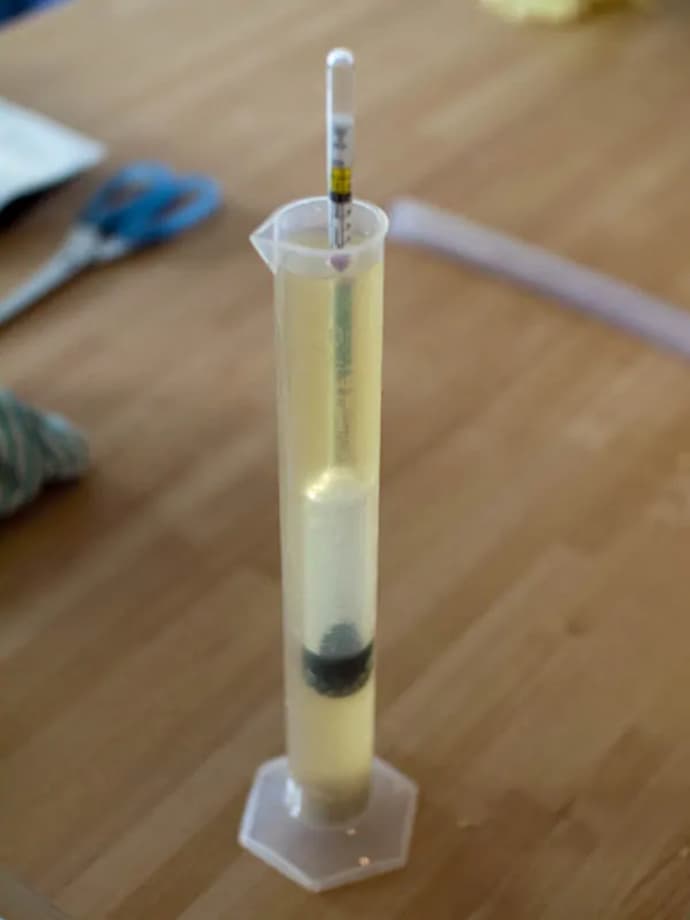As any homebrewer would tell you, the quest for the perfect beer is a labour of love, but it’s not without its challenges. To create a truly delicious beer, you need to pay close attention to every step of the brewing process from sanitizing to bottling. And one of the most important tools in your arsenal? The humble beer hydrometer.
Yes, hydrometers may sound like a boring science experiment, but they’re actually a crucial tool in the homebrewing process. With the ability to measure specific gravity and alcohol content, they can make all the difference between a mediocre brew and a magnificent one.
And let’s be real, who doesn’t want to impress their friends with a delicious, homemade beer? So, put down that store-bought can of beer and let’s dive into the world of hydrometers and homebrewing. Trust me, your taste buds (and your friends) will thank you.
What Is a Hydrometer?

It’s basically a thin, glass instrument that is weighted at the bottom to keep it upright. It has a graduated scale on the side that measures the specific gravity of a liquid. When you place the hydrometer in a liquid, it will float to a certain level, and the reading on the scale will tell you the specific gravity of the liquid.
Why Is It Important in Beer Brewing?
As already mentioned, the main reason to purchase a brewing hydrometer is to measure the specific gravity of your beer. Specific gravity is a measurement of the density of a liquid compared to water. Measuring it is essential in home brewing for a few reasons.
First, it helps you monitor the progress of fermentation. When yeast consumes the sugars in your wort, it produces alcohol and carbon dioxide. As the alcohol content increases, the specific gravity of the liquid will decrease.
By taking specific gravity readings at various points during fermentation, you can track the progress of fermentation and make sure everything is going smoothly. If the specific gravity doesn’t drop as much as expected, it could be a sign that something is wrong with your beer.
Secondly, these tools are crucial for calculating alcohol content. As we mentioned earlier, as alcohol is produced during fermentation, the specific gravity of the liquid decreases. By taking specific gravity readings before and after fermentation, you can calculate the alcohol content of your beer.
Doing so helps you judge the strength of your beer. If you’re preparing a strong beer, you’ll want to know the alcohol content so you can drink responsibly. Additionally, calculating alcohol content is essential if you plan to enter your beer into competitions.
How to Choose
Prices for an alcohol hydrometer can range from $7 for all-purpose units to more than $200 for those that measure very precise ranges. Certified traceable models may be purchased for under $20 each, and most brewers will find them to be more than sufficient.
There are a few things to consider when choosing a brewing hydrometer. Firstly, you’ll want to make sure you buy one that is designed for beer brewing. While there are other types of hydrometers available, they may not be calibrated for the specific gravity of the beer.
You’ll also want to consider the range it has. Make sure it can measure the specific gravity of the type of beer you’re making.
Finally, think about the size and shape of the beer brewing hydrometer. Some are easier to read than others, and some are more durable than others. Do your research and choose one that will work best for your needs.
Proper Use
Once you’ve chosen, it’s important to know how to use this tool correctly. Start by taking a sample of your beer and pouring it into a tall, narrow container like a graduated cylinder. Place the tool into the liquid and take a reading. Make sure you’re reading the correct scale on the tool (some have different scales for different liquids).

There are a few key readings you need to take:
- Starting Specific Gravity – This is the specific gravity of the wort before fermentation begins. The starting specific gravity will vary depending on the type of beer you’re brewing. For example, a light beer may have a starting specific gravity of around 1.040, while a strong beer may have a starting specific gravity of 1.080 or higher.
- Final Specific Gravity – This is the specific gravity of the beer after fermentation is complete. The final specific gravity will be lower than the starting specific gravity due to the production of alcohol. A typical final specific gravity for beer is around 1.010 to 1.020.
- ABV – This stands for “alcohol by volume” and is a measure of the alcohol content in your beer. To calculate ABV, you’ll need to take a starting specific gravity reading and a final specific gravity reading. Subtract the final specific gravity from the starting specific gravity and multiply by 131.25. The result will be the ABV of your beer.
The Final Wort
Finally, I’d like to point out that it’s essential to care for your specific gravity hydrometer properly to ensure accurate readings. Before use, make sure it’s clean and free from any debris or residue. After use, rinse it thoroughly with clean water and let it air dry. Store it in a safe place where it won’t get damaged or knocked over.
By using and caring for your hydrometer properly, you can ensure accurate readings and a successful brewing experience. Cheers to the power of this humble tool!



